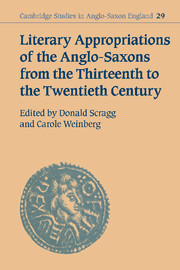Book contents
- Frontmatter
- Contents
- List of contributors
- Acknowledgements
- List of abbreviations
- Introduction. The Anglo-Saxons: fact and fiction
- 1 Victor and victim: a view of the Anglo-Saxon past in LaƷamon's Brut
- 2 Kings, constitution and crisis: ‘Robert of Gloucester’ and the Anglo-Saxon remedy
- 3 The South English Legendary: Anglo-Saxon saints and national identity
- 4 King Ælle and the conversion of the English: the development of a legend from Bede to Chaucer
- 5 Saxons versus Danes: the anonymous Edmund Ironside
- 6 New times and old stories: Middleton's Hengist
- 7 Crushing the convent and the dread Bastille: the Anglo-Saxons, revolution and gender in women's plays of the 1790s
- 8 Anglo-Saxon attitudes?: Alfred the Great and the Romantic national epic
- 9 ‘Utter indifference’?: the Anglo-Saxons in the nineteenth-century novel
- 10 The charge of the Saxon brigade: Tennyson's Battle of Brunanburh
- 11 Lady Godiva
- 12 The undeveloped image: Anglo-Saxon in popular consciousness from Turner to Tolkien
- Index of Anglo-Saxons mentioned in the text
- Index of authors and works cited
2 - Kings, constitution and crisis: ‘Robert of Gloucester’ and the Anglo-Saxon remedy
Published online by Cambridge University Press: 21 September 2009
- Frontmatter
- Contents
- List of contributors
- Acknowledgements
- List of abbreviations
- Introduction. The Anglo-Saxons: fact and fiction
- 1 Victor and victim: a view of the Anglo-Saxon past in LaƷamon's Brut
- 2 Kings, constitution and crisis: ‘Robert of Gloucester’ and the Anglo-Saxon remedy
- 3 The South English Legendary: Anglo-Saxon saints and national identity
- 4 King Ælle and the conversion of the English: the development of a legend from Bede to Chaucer
- 5 Saxons versus Danes: the anonymous Edmund Ironside
- 6 New times and old stories: Middleton's Hengist
- 7 Crushing the convent and the dread Bastille: the Anglo-Saxons, revolution and gender in women's plays of the 1790s
- 8 Anglo-Saxon attitudes?: Alfred the Great and the Romantic national epic
- 9 ‘Utter indifference’?: the Anglo-Saxons in the nineteenth-century novel
- 10 The charge of the Saxon brigade: Tennyson's Battle of Brunanburh
- 11 Lady Godiva
- 12 The undeveloped image: Anglo-Saxon in popular consciousness from Turner to Tolkien
- Index of Anglo-Saxons mentioned in the text
- Index of authors and works cited
Summary
In his preface to the De excidio Brittonum Gildas, after expressing his anxieties at the ills which have befallen the country of Brittannia and its inhabitants since the arrival of the saxones, comments:
Condolentis patriae incommoditatibus miseriisque eius ac remedii condelectantis edicturum putet.
This statement could also stand, I would propose, as an appropriate foreword to the metrical chronicle attributed to ‘Robert of Gloucester’, although Robert's concerns are, of course, not with the Romanized Britain of the fifth century, but with the Normanized England of the late thirteenth and early fourteenth centuries. Robert is not the first post-Conquest historian to write in the English vernacular. LaƷamon is a notable predecessor. But Robert is of exceptional importance in the context of post-Conquest retrospects upon the Anglo-Saxon period in that, whereas LaƷamon terminates his Brut with the death of the last British king, Cadwallader, Robert brings the account of English history up to his own day, and distinctively looks at the Anglo-Saxon past from out of the context of contemporary, late thirteenth-century England. This is, potentially, a significant political standpoint, and indeed, I hope to show that Robert plainly does promote certain aspects of Anglo-Saxon England as important in the shaping of his own society.
A brief review of what Robert's chronicle is (and, indeed, is not) may help to provide some context for the following discussion. It is, for example, preoccupied with kings and governance. History, to Robert, comprises the succession of monarchs and their acts (good and ill) of policy.
- Type
- Chapter
- Information
- Literary Appropriations of the Anglo-Saxons from the Thirteenth to the Twentieth Century , pp. 39 - 56Publisher: Cambridge University PressPrint publication year: 2000
- 4
- Cited by

